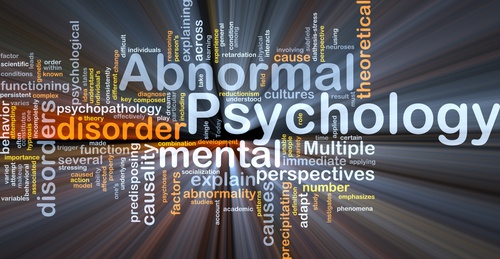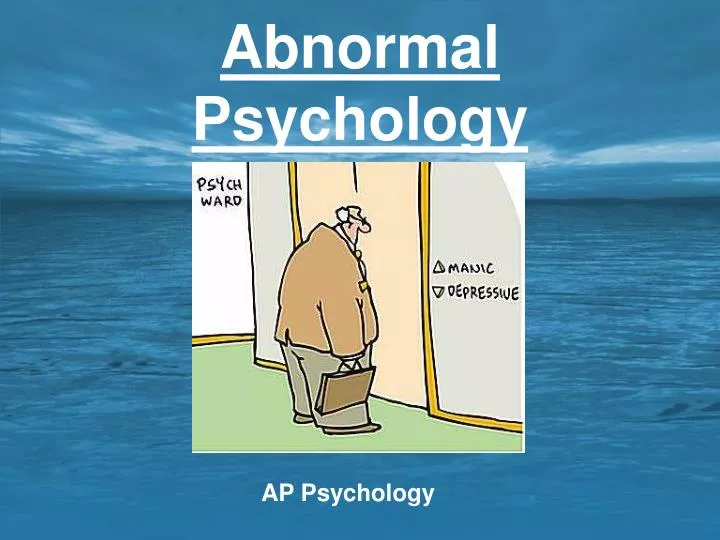Abnormal Psychology
Introduction:
In the complex tapestry of human behavior and intellectual health, abnormal psychology stands as a profound discipline that seeks to unravel the mysteries of the mind. This article embarks on a experience through the realms of peculiar psychology, delving into its numerous types, shedding mild on the multifaceted thinking of abnormality, tracing its evolution over history, and inspecting the complex boundaries of odd behavior. Through this exploration, we goal to deepen our grasp of the human psyche, foster intellectual fitness awareness, and cultivate empathy for those grappling with psychological challenges.
Types of Abnormality Psychology:
The spectrum of peculiar psychology encompasses several dimensions, each providing insights into the complexities of human cognition and emotion:
1. Clinical Disorders: These problems forged a spotlight on the emotional turbulence that person's experience, ranging from anxiety issues that purpose overwhelming fear to mood issues such as depression, which plunge folks into the depths of despair.
2. Psychotic Disorders: The world of psychotic disorders exposes the delicate stability between notion and reality, exemplified through conditions like schizophrenia where perceptions blur and the thinking grapples with delusions and hallucinations.
3. Neurodevelopmental Disorders: At the coronary heart of neurodevelopmental disorders lie prerequisites like ADHD and autism spectrum disorder, imparting windows into the early developmental struggles that impact cognition, social interaction, and communication.
4. Eating Disorders: An exploration of eating issues brings to light the profound psychological and emotional challenges entwined with distorted body photograph and disordered eating, shedding light on prerequisites like anorexia nervosa and bulimia nervosa.
5. Substance-Related Disorders: These issues delve into the complex realm of substance abuse and addiction, revealing how psychological well-being is intricately linked with bodily health.
Understanding Abnormal Psychology and Examples:
Abnormal psychology serves as a lens thru which we comprehend behaviors, thoughts, and feelings that deviate from societal norms, main to widespread distress. Examples abound, such as humans immobilized by intense phobias or those ensnared by way of compulsive rituals that dominate their lives.
The Concept of Abnormal in Psychology:
The very idea of abnormality is a nuanced assemble fashioned by cultural, historical, and societal forces. These dynamics have an effect on how we become aware of deviations from the norm and the extent to which they are deemed acceptable. The "Four Ds" criteria, encompassing deviance, distress, dysfunction, and danger, provide a framework for assessing atypical behavior, though the traces are frequently fluid and contextual.
History of Abnormal Psychology:
A historical standpoint unveils the evolution of attitudes toward intellectual fitness challenges. Ancient societies attributed extraordinary conduct to supernatural forces, step by step evolving to psychological theories in the 19th century that sought to recognize and deal with these conditions. The field's ride reflects the evolving perception of human nature and the pursuit of fantastic interventions.
Abnormal Behavior: Exploring the Boundaries:
Abnormal conduct dwells within a complex realm that challenges strict categorization. The boundary between normal and bizarre is often hazy, as human conduct exists on a continuum. The Diagnostic and Statistical Manual of Mental Disorders (DSM) aids in classification, yet it acknowledges the nuances that embody the human experience.
Conclusion:
Abnormal psychology invitations us to peer into the problematic mosaic of the human mind. By exploring its types, comprehending its concepts, tracing its historical path, and appreciation its boundaries, we domesticate empathy, awareness, and acceptance. Embracing abnormality allows us to dismantle the stigma surrounding intellectual health and forge a compassionate society where these grappling with psychological challenges locate the appreciation and help, they deserve. In this collective journey, understanding and empathy intertwine, growing an environment where the intricacies of the human psyche are acknowledged and celebrated.

/122374885-56a795f75f9b58b7d0ebef01.jpg)



Comments
Post a Comment